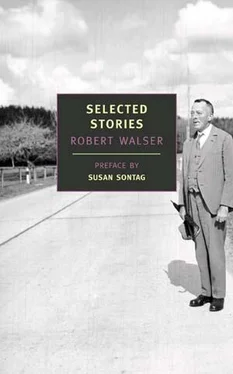Yet I promised Frau Wilke to get up earlier, and in fact I did then also begin to work hard.
Often I walked in the neighboring forest of fir and pine, whose beauties, wonderful winter solitudes, seemed to protect me from the onset of despair. Ineffably kind voices spoke down to me from the trees: “You must not come to the dark conclusion that everything in the world is hard, false, and wicked. But come often to us; the forest likes you. In its company you will find health and good spirits again, and entertain more lofty and beautiful thoughts.”
Into society, that is, where the big world foregathers, I never went. I had no business there, because I had no success. People who have no success with people have no business with people.
Poor Frau Wilke, soon afterwards you died.
Whoever has been poor and lonely himself understands other poor and lonely people all the better. At least we should learn to understand our fellow beings, for we are powerless to stop their misery, their ignominy, their suffering, their weakness, and their death.
One day Frau Wilke whispered, as she stretched out her hand and arm to me: “Hold my hand. It’s like ice.”
I took her poor, old, thin hand in mine. It was cold as ice.
Frau Wilke crept about her home now like a ghost. Nobody visited her. For days she sat alone in her unheated room.
To be alone: icy, iron terror, foretaste of the grave, forerunner of unpitying death. Oh, whoever has been himself alone can never find another’s loneliness strange.
I began to realize that Frau Wilke had nothing to eat. The lady who owned the house, and later took Frau Wilke’s rooms, allowing me to stay in mine, brought, of course in pity for her forsaken state, every midday and evening a cup of broth, but not for long, and so Frau Wilke faded away. She lay there, no longer moving: and soon she was taken to the city hospital, where, after three days, she died.
One afternoon soon after her death, I entered her empty room, into which the good evening sun was shining, gladdening it with rose-bright, gay and soft colors. There I saw on the bed the things which the poor lady had till recently worn, her dress, her hat, her sunshade and her umbrella, and, on the floor, her small delicate boots. The strange sight of them made me unspeakably sad, and my peculiar state of mind made it seem to me almost that I had died myself, and life in all its fullness, which had often appeared so huge and beautiful, was thin and poor to the point of breaking. All things past, all things vanishing away, were more close to me than ever. For a long time I looked at Frau Wilke’s possessions, which now had lost their mistress and lost all purpose, and at the golden room, glorified by the smile of the evening sun, while I stood there motionless, not understanding anything any more. Yet, after standing there dumbly for a time, I was gratified and grew calm. Life took me by the shoulder and its wonderful gaze rested on mine. The world was as living as ever and beautiful as at the most beautiful times. I quietly left the room and went out into the street.
[1918]
I HAD taken some steps, useless they had been, and now I went out into the street, agitated, numb. At first it was like being sightless, and I thought nobody saw anybody any more, everybody had been blinded and life was at a standstill, everybody groping around in confusion.
Because my nerves were so tense, I sensed things with exceptional sharpness. Façades rose up before me, cold. Heads and clothes rushed towards me and vanished like ghosts.
A shiver passed through me; I hardly dared to walk on. One impression after another seized hold of me. I was swaying, everything was swaying. All the people walking here had plans in mind, business. A moment before, I too had had an end in view; but now, no plans at all, but I was searching for one again, and I hoped to find something.
The crowds were seething with energy. Everybody thought himself out in front. Men, women floated by. All seemed to be making for the same goal. Where did they come from, where were they going?
One of them was this, another that, a third nothing. Many were driven, lived without purpose, let themselves be flung every which way. Any sense for the good was set aside, not used; intelligence was groping in emptiness; fine faculties and plenty bore meager fruit.
Evening had come; the street was like an apparition. Thousands walked here every day. There was no room anywhere else. Early in the morning they were brisk; at night, tired. Often they came to nothing. Actions rolled over one another; ability was often exasperated, to no end.
As I was walking along thus, I met the gaze of a grandee’s coachman. Then I jumped onto a bus, rode on for a stretch, went into a restaurant to eat something, and then I went out again. Everywhere an even-measured going and flowing. Human understanding was taken for granted. Everyone knew, in an instant, pretty well everything about everyone else, but the interior life remained secret. Soul continuously renews itself.
Wheels were grinding, voices became loud; yet the whole scene was oddly still.
I wanted to speak with someone, but found no time; sought some fixed point, but found none. In the midst of the unrelenting forward thrust I felt the wish to stand still. The muchness and the motion were too much and too fast. Everyone withdrew from everyone. There was a running, as of something liquefied, a constant going forth, as of evaporation. Everything was schematic, ghostlike, even myself.
Suddenly I saw an unspeakable heaviness in all the haste and hurry, and I told myself: “This hugger-mugger totality wants nothing and does nothing. They are entangled with one another, do not move, prisoners; they abandon themselves to opaque pressures but they themselves are the power that lies upon them and binds them, mind and limb.”
As I was passing by, a woman’s eyes spoke to me: “Come with me. Quit the whirlpool, leave that farrago behind, join the only person who will make you strong. If you are loyal to me, you’ll be rich. In the turmoil you are poor.”
I wanted to follow her call, but was swept away in the stream. The street was just too irresistible.
Then I came into the open country, where everything was quiet. A train with red windows hurtled past, close by. In the distance the traffic’s billowing ceaseless subtle thunder was faintly to be heard.
I walked along the edge of the forest and murmured a poem by Brentano. The moon was glancing through the branches.
Suddenly I noticed a man standing not far off, quite motionless, and apparently watching for me.
I walked around him, keeping him constantly in sight, which annoyed him; for he called out to me: “Why not come here and take a proper look at me? I am not what you think.”
I went over to him. He was like anyone else, except that he looked strange, nothing more. Then I went back again to where the light was, and the street.
[1919]
I’VE just been writing a letter in which I announced that I had finished a novel with or without pain and distress, that the considerable manuscript was lying in my drawer ready to go, with the title already in position and packing paper at hand, for the work to be wrapped and sent in. Furthermore, I have purchased a new hat, which for the present I shall wear only on Sundays, or when a visitor comes to me.
Recently a parson visited me. I found it nice and most proper that he did not look at all like a professional one. The parson told me of a lyrically gifted teacher. I intend to go before long on foot through the spring country to this person, who instructs the village schoolchildren and writes verse as well. I find it beautiful and natural that a teacher should concern himself with higher things and have experiences of the more profound sort. Yet on account of his profession he has to deal with something serious: with souls! Here I think of the wonderful Life of the Merry Schoolmaster, Maria Wuz, of Auenthal, a Kind of Idyll, by Jean Paul, a book, or booklet, that I have read with delight I know not how often and will probably read again and again. The main point is that now the spring is just beginning again. So here and there I’ll succeed in writing a pleasant-sounding line of springtime verse. It is wonderful that now one need not think at all of heating. Thick winter coats will soon have outplayed their role. Everybody will be glad if he can stand around and go about coatless. Thank God there are still things about which everyone is united and agrees nicely with one another.
Читать дальше












